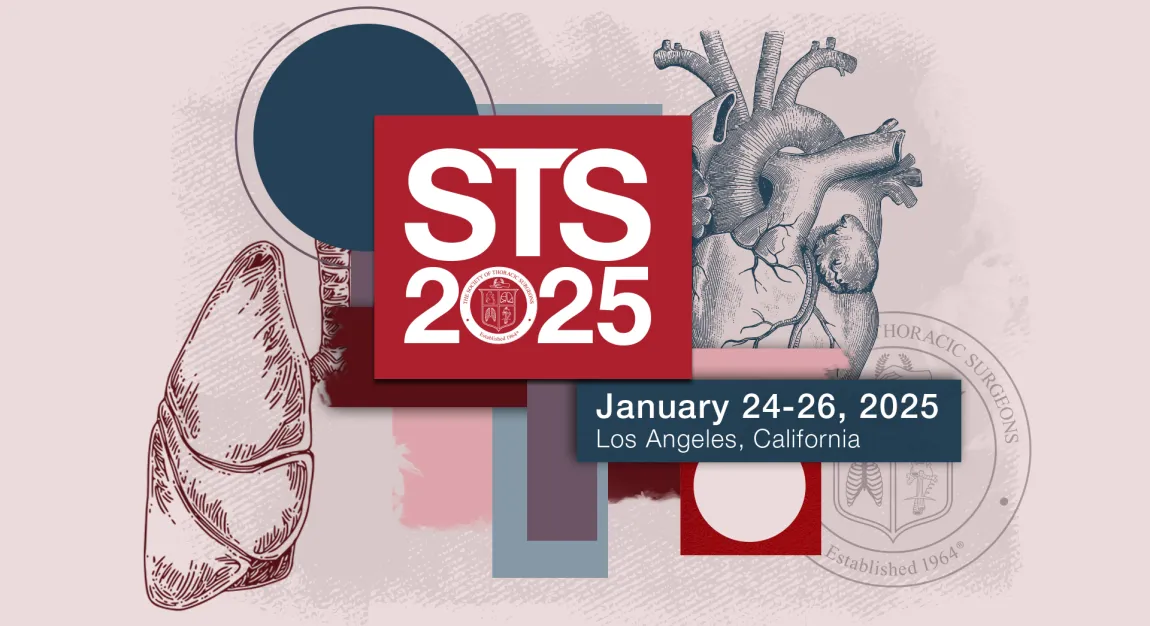STS is offering three concurrent half-day programs on Thursday, January 23, 2025, for attendees who want to round out their educational experience at STS 2025. These symposia are also available to attend as a standalone event (though STS 2025 attendees receive a discount when adding a pre-conference event to their meeting registration). STS members save even more! (Not a member yet? Apply today.)
Symposium registration includes lunch beginning at 11:30 a.m. as well as a Thursday evening reception following the conclusion of the half-day course.
The STS APP Conference—Redesigning the Future Together
January 23, 2025
1 - 5:15 p.m. PT (lunch at 11:30 a.m.; reception follows course conclusion)
STS is proud to launch the first program for advanced practice providers (APPs), titled “Redesigning the Future Together,” at the 2025 STS Annual Meeting. APPs play a pivotal role in providing care throughout the continuum for patients undergoing cardiothoracic surgery. This half-day program aims to build a stronger community by featuring presentations and expert panel discussions focused on strengthening clinical management and showcasing strategies for APPs to achieve professional success, emerge as leaders, and cultivate APP roles in the CTS specialty.
Course Directors
Menaka Ponnambalam, RN(EC), MN, NP-Adult
Pinki Patel, DNP, MSN, CRNP, APC-HQS
Christine Welch, PA-C
Angela Lee, RN, NP
View the Agenda
Lung Cancer: Clinical Trials Meet Clinical Practice
January 23, 2025
1 - 5:15 p.m. PT (lunch at 11;30 a.m.; reception follows course conclusion)
Diagnosis and treatment paradigms for patients with early stage and locally advanced non-small cell lung cancer have changed dramatically. It is a challenge to keep up with the pace of new technology, clinical trials, and drug approvals. In this session, we will provide an overview of recent diagnostic advances and clinical trials. More importantly, through “classroom,” “workroom,” and interactive tumor board sessions, we will describe best practices for incorporating this information into the real-world practice of busy cardiothoracic surgeons.
Course Directors
Mara Antonoff, MD
Jessica Donington, MD, MS
Kiran H. Lagisetty, MD
John D. Mitchell, MD
Brendon M. Stiles, MD
View the Agenda
Aortic Universe: From Birth to Adulthood
January 23, 2025
1 - 5:15 p.m. PT (lunch at 11:30 a.m.; reception follows course conclusion)
This comprehensive course delves into aortic management from birth to adulthood, providing an in-depth overview encompassing the full spectrum of congenital and acquired aortic diseases. Designed for medical professionals, including cardiothoracic surgeons, cardiothoracic residents and fellows, advanced practice providers, nurses and medical students, this course equips participants with the knowledge and skills needed to diagnose, manage, and treat aortic conditions across different stages of life. The course is focused on management strategies, with a heavy focus on detailed surgical videos and case-based presentations. Join us in this journey through the life cycle of the newly designated aortic “organ”, from birth to adulthood, and enhance your ability to provide exceptional care to patients with aortic disease.
Course Directors
Ibrahim Sultan, MD
George J. Arnaoutakis, MD
Karen Kim, MD, MS
View the Agenda
Pricing
| STS Member Rates | Add-On to STS 2025 | Pre-Conference Symposium Only |
|---|---|---|
| Surgeons, Physician Members | $250 | $400 |
| Associate Members (Allied Health) | $125 | $200 |
| Resident/Fellow & Medical Student Members | $100 | $150 |
| Non-Member Rates | Add-On to STS 2025 | Pre-Conference Symposium Only |
|---|---|---|
| Surgeons & Physicians | $350 | $500 |
| Allied Health Professionals | $175 | $250 |
| Medical Students & Trainees | $150 | $200 |
Exhibit Opportunities
View the Exhibit Prospectus to learn about tabletop and symposium opportunities during all three pre-conference sessions.
Ethical MedTech Compliance
This symposia has been assessed by Ethical MedTech and is COMPLIANT with the MedTech Europe Code of Ethical Business Practice.
Accreditation
The Society of Thoracic Surgeons is accredited by the Accreditation Council for Continuing Medical Education (ACCME) to provide continuing medical education for physicians.
STS 2025 Pre-Conference - APP Redesigning the Future Together
The Society of Thoracic Surgeons designates this live activity for a maximum of 4.0 AMA PRA Category 1 Credits™. Physicians should claim only the credit commensurate with the extent of their participation in the activity.
STS 2025 Pre-Conference - Lung Cancer: Clinical Trials Meet Clinical Practice
The Society of Thoracic Surgeons designates this live activity for a maximum of 3.25 AMA PRA Category 1 Credits™. Physicians should claim only the credit commensurate with the extent of their participation in the activity.
STS 2025 Pre-Conference - Aortic Universe: From Birth to Adulthood
The Society of Thoracic Surgeons designates this live activity for a maximum of 3.5 AMA PRA Category 1 Credits™. Physicians should claim only the credit commensurate with the extent of their participation in the activity.
Physician Assistants (PAs) may claim AMA PRA Category 1 Credits™ for completing any of these activities. NCCPA accepts AMA PRA Category 1 Credit™ from organizations accredited by ACCME or a recognized state medical society.
